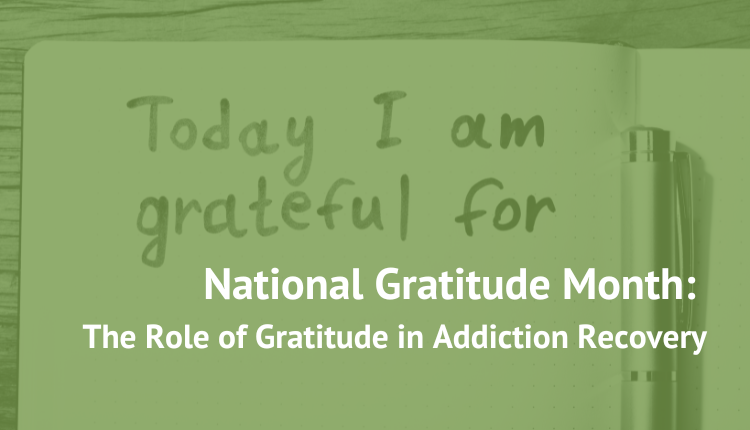The Role of Gratitude in Addiction Recovery
Origins of National Gratitude Month
National Gratitude Month is celebrated in November. It was created in 2015 with help from Stacey Grewal, an author and life coach, to inspire people to focus on the positive aspects of life. Grewal believed that practicing gratitude could significantly improve well-being by fostering a more positive outlook on life and encouraging compassion in communities. By dedicating November to the practice of gratitude, individuals can reflect on the blessings in their lives and develop resilience during challenging times.
For those in addiction recovery, National Gratitude Month presents an opportunity to acknowledge their progress, appreciate the support they’ve received, and focus on the positive changes they’ve made. Practicing gratitude has scientifically supported benefits that can greatly impact the recovery process.
The Importance of Gratitude in Addiction Recovery
Gratitude plays a crucial role in the concept of “recovery capital,” a term introduced by William Cloud and Robert Granfield, and later expanded by Cloud and William White in 2008. Recovery capital refers to the internal and external resources individuals use to maintain their sobriety. These resources include personal strengths, social networks, physical health, and emotional resilience. Cloud and White argue that the more recovery capital a person has, the better their chances of long-term recovery (White & Cloud, 2008).
Recent studies have explored how gratitude fits into this framework. In 2017, Chen conducted research that highlighted the role of gratitude as a form of recovery capital. He found that practicing gratitude helps individuals maintain sobriety by encouraging a focus on the positive aspects of life. This positive focus helps individuals build resilience and navigate the challenges of recovery. As Chen explains, “Gratitude promotes a focus on the positive aspects of life, which can be critical in navigating the challenges of recovery and sustaining long-term sobriety.”
Similarly, LaBelle and Edelstein’s 2018 study found that gratitude positively impacts the recovery process. Participants in 12-step programs who embraced gratitude experienced more emotional well-being and were more likely to achieve positive outcomes. Although more research is needed to fully understand how gratitude works across different stages of recovery, these findings emphasize its powerful role in the healing journey.
Additionally, a 2021 study by Charzyńska in Poland further explored how spiritual coping strategies—such as gratitude—affect addiction recovery. The study found that individuals who incorporated gratitude into their recovery stayed sober longer and had better success rates in completing their addiction treatment programs. This emerging research underscores the importance of spiritual health, including gratitude, in sustaining recovery.
Gratitude as a Daily Practice in Recovery
Practicing gratitude daily can significantly transform how individuals view their recovery journey. As they build new lives beyond addiction, focusing on gratitude allows them to see the positives, even during difficult moments. Gratitude isn’t just an emotion; it’s an active practice of noticing and valuing the good things in life.
For those in recovery, this practice can be especially important. By regularly acknowledging the support of loved ones, celebrating personal progress, and appreciating the small joys in life, individuals can maintain a positive outlook that fosters emotional strength and resilience. This mindset makes it easier to manage the inevitable ups and downs of the recovery process.
Tips for Practicing Gratitude in Recovery
- Increase Your Awareness: Make an intentional effort to recognize the small things that bring joy or comfort each day. Whether it’s the kindness of a friend, a sunny day, or simply a moment of peace, take time to appreciate it.
- Keep a Gratitude Journal: Writing down what you’re thankful for at the end of each day is a powerful way to cultivate gratitude. Reflecting on these moments can enhance both your physical and emotional well-being.
- Express Gratitude to Others: Don’t just keep gratitude to yourself—share it. Expressing your appreciation to those who have supported you during your recovery can strengthen relationships and encourage continued support.
The Benefits of Gratitude in Recovery
One of the key benefits of practicing gratitude is its ability to help individuals in recovery better manage the emotional ups and downs they face. Gratitude helps soften negative emotions and provides a sense of peace as individuals move beyond their past substance use. This positive mindset not only helps maintain sobriety but also serves as an example and inspiration to others in recovery.
By practicing gratitude consistently, individuals build recovery capital—a set of resources that can help them sustain their sobriety and navigate the challenges that arise in their recovery journey. This National Gratitude Month, take the opportunity to embrace gratitude as a tool for emotional healing and long-term success in recovery.
At New Paradigm Recovery, we know the impact gratitude can have, especially during National Gratitude Month. Our programs incorporate gratitude practices, helping clients focus on the positive aspects of their journey and build resilience for lasting recovery. We invite you to explore how gratitude can transform your recovery experience. Contact us today to learn more about our personalized treatment options for outpatient addiction care in Northern Virginia.
References
Chen, G. (2017). Does gratitude promote recovery from substance misuse? Addiction Research & Theory, 25(2), 121-128. https://doi.org/10.1080/16066359.2016.1212337
LaBelle, O. P., & Edelstein, R. S. (2018). Gratitude, insecure attachment, and positive outcomes among 12-step recovery program participants. Addiction Research & Theory, 26(2), 123-132. https://doi.org/10.1080/16066359.2017.1333111
Charzyńska, E. (2021). The effect of baseline patterns of spiritual coping, forgiveness, and gratitude on the completion of an alcohol addiction treatment program. Journal of Religion and Health. https://pubmed.ncbi.nlm.nih.gov/33515388/
White, W., & Cloud, W. (2008). Recovery capital: A primer for addictions professionals. Counselor, 9(5), 22-27. https://www.naadac.org/assets/2416/whitewlcloudw2008_recovery_capital_a_primer.pdf
For further reading, check out our post about gratitude lists.

